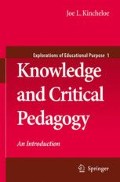Since epistemology is not a topic that is typically reported on the 24 hour TV news cycle of the contemporary era, the assumptions that shape what is done in schools and classrooms are typically hidden from public view and discussion. Knowledge and Critical Pedagogy: An Introduction is obsessed with the nature of these assumptions about knowledge (epistemology) and their effects on everyday teaching practice. As previously mentioned my work here is grounded on a set of theoretical assumptions emerging from the critical pedagogical tradition-a way of viewing education that searches for occluded forces that shape lived experiences. I am particularly interested in the notion of an evolving criticality that listens carefully to feminist, anti-racist, anti-colonial, and indigenous voices and incorporates their insights into the critical canon. In this context this book provides essential but often ignored insights into why educational leaders, politicians, teachers, students, and the public view teaching and learning in particular ways.
Before we go any farther, it is important to explain precisely what I mean by an evolving criticality in the concepts of critical theory and critical pedagogy. Critical theory/pedagogy—in the spirit of this evolving criticality—is never static as it is always evolving, changing in light of both new theoretical insights and new problems and social circumstances. Thus, an evolving criticality draws not only on the Frankfurt School and European critical theory but also explores diverse global theoretical traditions that expand our understanding of criticality and demand an understanding of diverse forms of oppression including class, race, gender, sexual, cultural, religious, colonial and ability-related concerns. In this context critical theorists/educators become detectives of new theoretical insights, perpetually searching for new and interconnected ways of understanding power and oppression and the ways they shape everyday life and human experience.
Access this chapter
Tax calculation will be finalised at checkout
Purchases are for personal use only
Preview
Unable to display preview. Download preview PDF.
Editor information
Editors and Affiliations
Rights and permissions
Copyright information
© 2008 Springer Science + Business Media B.V
About this chapter
Cite this chapter
(2008). The Politics of Epistemology, the Politics of Education. In: Kincheloe, J.L. (eds) Knowledge and Critical Pedagogy. Explorations of Educational Purpose, vol 1. Springer, Dordrecht. https://doi.org/10.1007/978-1-4020-8224-5_2
Download citation
DOI: https://doi.org/10.1007/978-1-4020-8224-5_2
Publisher Name: Springer, Dordrecht
Print ISBN: 978-1-4020-8223-8
Online ISBN: 978-1-4020-8224-5
eBook Packages: Humanities, Social Sciences and LawEducation (R0)

